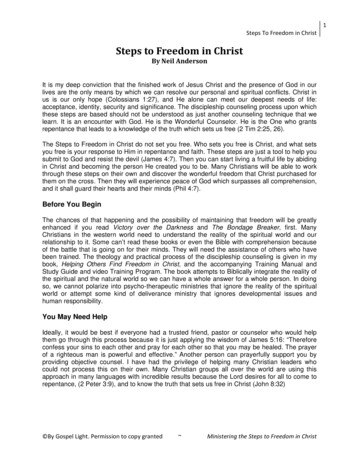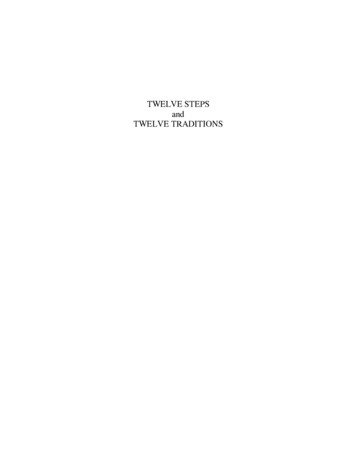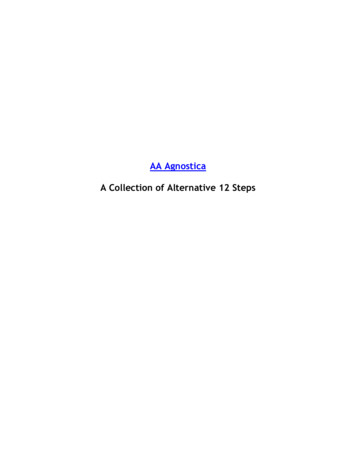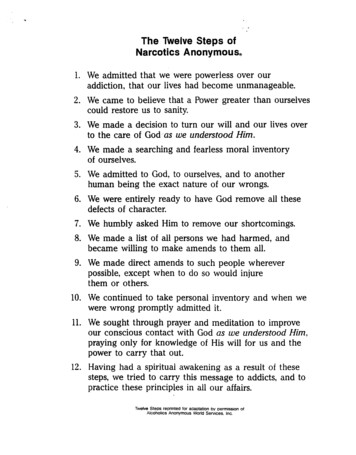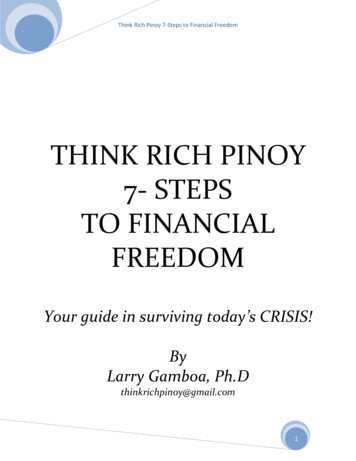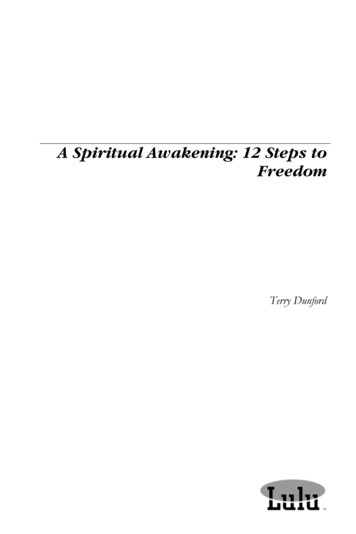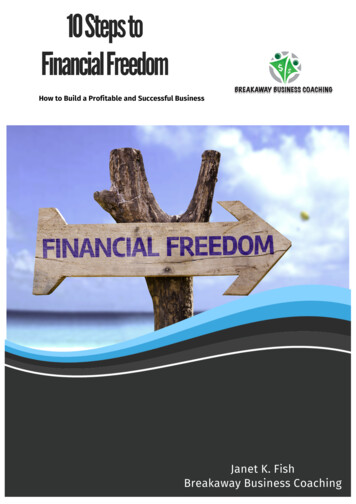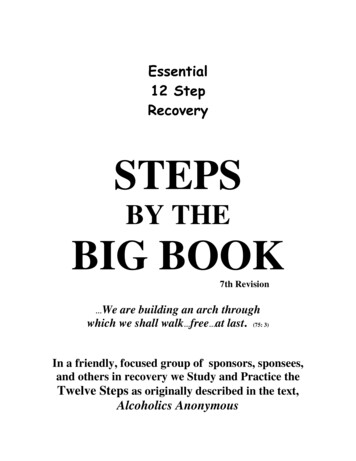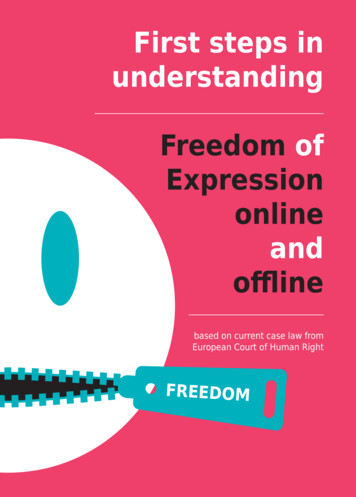
Transcription
First steps inunderstandingFreedom ofExpressiononlineandofflinebased on current case law fromEuropean Court of Human RightFREEDOM
Editors: Bogdan Manolea & Liana GaneaData collection assistants: Patricia Iacob, Cezara PanaitText review: Valentina PavelDesign: Lucian NițăThis publication was developed under the “Development and Enhancement ofLegal Frameworks in Eastern Europe and Eurasia to Protect Internet Freedom”program, implemented by the American Bar Association Rule of Law Initiative(ABA ROLI) and supported by the United States Department of State.The entire enhanced version of this brochure can be found online at https://cases.internetfreedom.blogThe brochure is also available on the website in Romanian, Macedonian,Serbian, Russian, Ukrainian, Georgian, Hungarian, Armenian andAlbanian.In order to promote its content and to allow using it in any derivative works asmuch as possible, this brochure is licensed under a Creative Commons Attribution-ShareAlike 4.0 International License.
Tableofcontents1Introduction2Content Regulation3Duties and Responsibilities - online and offline4Intermediary liability for Internet services5The right to information6Internet blocking7Freedom of expression versus privacy8Freedom of expression versus copyright9Other limitations (national security, protectionof health or morals, judicial proceedings)10 Licensing
1Introduction2First steps in understanding Freedom of Expression online and offline
1.1. Why this brochure on Internet and Freedom ofExpression?The Internet has significantly changed our lives in the past years in many areas, including the way we access andpublish information. But most importantly, it has enhanced the exercise of our freedom of expression rights bothby allowing access to various sources of information but also by significantly democratizing the open publishingof any kind of information.“In the light of its accessibility and its capacity to store and communicate vast amounts of information, theInternet plays an important role in enhancing the public’s access to news and facilitating the dissemination ofinformation in general.”Times Newspapers Ltd v. the United Kingdom (nos. 1 and 2), ECtHR, 2009Consequently, this has turned the freedom of expression – especially in the online environment – in a subject thatconcerns us all. Not just the journalists or the NGOs dealing with freedom of expression.“User-generated expressive activity on the Internet provides an unprecedented platform for the exercise offreedom of expression.”Delfi AS v. Estonia 2015 [Grand Chamber], ECtHR, 2015Also it has become essential that the information explaining the basic concepts around freedom of expression andthe relevant court’s jurisprudence are simplified and explained to a large audience that could be interested in thesubject.“the function of bloggers and popular users of the social media may be also assimilated to that of “publicwatchdogs” in so far as the protection afforded by Article 10 is concerned.”Case Magyar Helsinki Bizottság v. Hungary [Grand Chamber], ECtHR, 2016While many books and legal studies for judges or other legal practitioners have been published on the subject matter,we believe there is now even greater need to simplify and explain the fundamentals of freedom of expression,especially as applied to the digital world. All this is presented through the lens of the current jurisprudence of theEuropean Court of Human Rights (ECtHR), that should be the main reference point for all European Internet users.The idea of this brochure emerged also as a result of a few personal experiences in dealing with freedom ofexpression in the past years:First, the subject seems to be interesting not only for professional journalists, but also for various other kinds ofInternet users who have very diverse educational backgrounds, and, in general, not too much legal knowledge.Nevertheless, they all engage in communicating information on the Internet and sometimes claim the breach oftheir freedom of expression rights.Secondly, the policy decision making process surrounding freedom of expression often seems to be hasty, withoutenough time being allowed for lengthy public debates or for the use of detailed or comprehensive reports, as basisfor the decisions. This is especially true for certain countries in South and Eastern Europe. Therefore excerpts ofECtHR arguments and conclusions can be widely accepted points of reference and, as a consequence, a usefuladvocacy tool in a debate.Thirdly, in front on the information flow available today many users are looking for easy to understand, distilledinformation in order to shape their opinion (and not for blocks of legalese text that could look far away or fromanother century).First steps in understanding Freedom of Expression online and offline3
But we believe most of the decisions and arguments for freedom of expression in the ECtHR jurisprudence areeasily understandable for a wider audience, if presented properly.“Article 10 of the Convention guarantees freedom of expression to “everyone”. No distinction is made in itaccording to whether the aim pursued is profit-making or not.”Neij and Sunde Kolmisoppi v. Sweden, ECtHR, 20131.2. Freedom of expression. Where do we start from?Freedom of expression is a widely used, many times abused, and yet insufficiently understood fundamental right.When we don’t like what someone else says, we want them silenced and admonished.When we want to say something, ostensibly under the same lines as the speech we disagree with, we think weare entitled to freely do so.But why do we have a fundamental right to freedom of expression, what is it useful for and why and when and howshall this right be limited, we rarely consider.Freedom of expression “is applicable not only to “information” or “ideas” that are favourably received or regardedas inoffensive or as a matter of indifference, but also to those that offend, shock or disturb. Such are the demandsof pluralism, tolerance and broadmindedness without which there is no “democratic society”.Axel Springer v. Germany [Grand Chamber], ECtHR, 2012There is no agreed line of thinking answering to the above statements. The good news is that there are plentyof political philosophy thinkers, legal documents and court decisions that give us some guidance. And the evenbetter news is that since the legal and juridical implementation of this right in various contexts is always dynamic,anyone could have a say and influence the way policy is implemented. To do so, we need to better understand thebasic fundamentals of this right.A summary of some of the key concepts behind the right to freedom of expression is listed below.What is freedom of expression?“ Freedom of expression constitutes one of the essential foundations of a democratic society and one of the basicconditions for its progress and for each individual’s self-fulfilment.”Axel Springer v. Germany [Grand Chamber], ECtHR, 2012 It is an important instrument of freedom of conscienceIt allows for conscient choices based on adherence to certain values, and therefore grants individual autonomyand defines each person’s identityIt contributes to knowledge and understanding, by debating about social and moral values and allowing for amarketplace-of-ideasIt allows for the communication of political ideas, and therefore contributes to democracyIt builds tolerance by allowing the others to express themselvesIt contributes to the artistic development, and it facilitates academic and scientific progress1What does freedom of expression consist of?4First steps in understanding Freedom of Expression online and offline
the right to disseminate information, in all forms and shapes, and;the right of the others to receive it.Freedom of expression “applies not only to the content of information but also to the means of dissemination, sinceany restriction imposed on the means necessarily interferes with the right to receive and impart information”.Özturk vs Turkey [Grand Chamber], ECtHR, 1999Why are we limiting freedom of expression? Because it is harming the exercise of other rights (the right to privacy, the right to a fair trial, the right tofreedom of thought, conscience and religion) or it is overstepping fundamental human rights boundaries (theprohibition of discrimination and the prohibition of abuse of rights)Because it is not done in good faith (publication of insufficiently verified facts, pure offensive language thatserves no public interest debate, etc.)Because it is harmful and it is not of public interestBecause it is endangering the safeguarding of democracy or the law and order (divulging state secrets, riskinga breach of peace, etc.)“As set forth in Article 10, freedom of expression is subject to exceptions, which must, however, be construedstrictly, and the need for any restrictions must be established convincingly.”Axel Springer v. Germany [Grand Chamber], ECtHR, 2012How should these limits be? Provided by lawPursue a legitimate aim (protect other rights or interests)Necessary in a democratic society (there has to exist a pressing social need)ProportionalExpression can take various forms: spoken and written words, art works, films, theatre music, other performingarts or happenings, including the destruction of property, when such an act has a “speech” content (real-lifeexamples would include the burning of the national flag, throwing a paint can on a statue). Refraining fromexpression is also a form of the right to freedom of expression (the right to be silent).Freedom of expression encompasses a wide spectrum of communications, from political expression, to academic,artistic or commercial communication, each of these being afforded different levels of protection. Freedom ofexpression includes the right to access information, which in the case of journalists could mean being grantedaccess in a public institution, including courts, or to a public document, including data of secret services. Whereasin the case of citizens, it could mean no censorship on access to information on the Internet.Expression can be communicated via various channels: print media, books, letters, posters, broadcasting channels,and – of course, in the past years - mostly via the Internet.1.3. Freedom of expression as a fundamental rightAs a fundamental human right, the right to freedom of expression is guaranteed by a number of relevantinternational law documents and treaties.The Universal Declaration of Human Rights adopted by the United Nations General Assembly in 1948 guaranteesthe right to freedom of speech in Article 19, and so does the International Covenant on Civil and Political RightsFirst steps in understanding Freedom of Expression online and offline5
adopted by the same body in 1966; it guarantees this right, also under Article 19.The Charter of Fundamental Rights of the European Union was adopted in 2000 by the European Parliament,the Council of Ministers and the European Commission, and came into force in 2009, and it is considered the‘Constitution’ of the European Union. It also safeguards the right to freedom of expression under its Article 11.Of special relevance is the European Convention on Human Rights (ECHR) of the Council of Europe, openedfor signature in 1950 that has included freedom of expression in Article 10. It came into force in 1953 and wasamended, during the years, by the adoption of 16 Protocols2. Some protocols to the Convention are not yetratified by each country. The European Court of Human Rights is the body that oversees the implementation ofthe Convention in the 47 Council of Europe member states.As the European Convention on Human Rights represents the main human rights instrument for the Council ofEurope states, this brochure focuses mainly on the jurisprudence developed by the European Court of HumanRights.1948(UDHR)Universal Declaration ofHuman Rights(ECHR)European Convention onHuman Rights19531966(ICCPR)International Covenant on Civiland Political Rights(CFREU)Charter of Fundamental Rightsof the European Union2009Article 10 of the European Convention on Human RightsFreedom of expression1. Everyone has the right to freedom of expression. This right shall include freedom to holdopinions and to receive and impart information and ideas without interference by public authorityand regardless of frontiers. This Article shall not prevent States from requiring the licensing ofbroadcasting, television or cinema enterprises.2. The exercise of these freedoms, since it carries with it duties and responsibilities, may be subjectto such formalities, conditions, restrictions or penalties as are prescribed by law and are necessaryin a democratic society, in the interests of national security, territorial integrity or public safety, forthe prevention of disorder or crime, for the protection of health or morals, for the protection of thereputation or rights of others, for preventing the disclosure of information received in confidence, orfor maintaining the authority and impartiality of the judiciary.1.4. How to understand this brochureThe scope of the right to freedom of expression is based on changing philosophical, political and legal concepts.It has to be analyzed bringing in the specific geographical, legal, and social contexts. Most of the times it involvesa balancing exercise with other rights and fundamental values.Therefore, the cases presented in this brochure should only be given a reference value. Such jurisprudence as thatof the ECtHR is ever-changing, and sometimes conflicting in itself. It can even be sometimes left to criticism as itresults every now and then in disappointing outcomes for those who promote the fundamental rights to freedomof expression and access to information. Moreover, the technical developments of the Internet might changecertain assumptions that we have today and that could be included in future decisions.6First steps in understanding Freedom of Expression online and offline
Nevertheless, such jurisprudence as that of ECtHR can be visionary many times, and it has the important value ofpromoting the basic standards in legally granting the rights to freedom of expression and access to information.The distillation of the entire ECtHR current jurisprudence comes at a cost that it is well worth pointing. First of all,the information in this brochure may not constitute in any case legal advice. Second, the editors of the brochurehad to limit the information to be presented, a choice that for certain legal professionals might be a shortcoming.Also, the selection of the domains and cases forced us to leave certain important aspects covered very briefly –such as the issues of “hate speech” or “protection of journalistic sources”.In order to simplify the text in the brochure version, certain quotes have been stripped down from internalreferences to other ECtHR cases or documents. Also, the name of the case is indicated at a minimum, as “Nameof plaintiffs v. Country, year”. The cases decided by the Grand Chamber are marked as such. All the bolding of thetext in the quotes belongs to the editors in order to highlight the main keywords relevant for the reader. Footnotetext references are included at the end of the brochure.More details are included in the web version, available at https://cases.internetfreedom.blog , that includes a shortsummary of each case, and links to the actual text of the judgement/decision or to legal summaries.We would also have to acknowledge that our work has been helped not only by the fact that all information relatedto the case-law of the ECtHR is publicly available on the Internet, but also due to the existence of various otherprojects and publications – all available online - that have systematized or analyzed in more detail a lot of theECtHR jurisprudence related (also to) Article 10.We list here the most important ones, especially for users that might like or need to go into more detail on certainspecificities of freedom of expression: The factsheets by theme on the Court’s case-law and pending cases compiled by the Press Service of theCourt3Fundamental Rights Agency – Case-law Database provides a compilation of Court of Justice of the EuropeanUnion (CJEU) and European Court of Human Rights (ECtHR) case-law with direct references to the Charter ofFundamental Rights of the European Union4Internet: case-law of the European Court of Human Rights (2015)5Freedom of expression in Europe Case-law concerning Article 10 of the European Convention on Human Rights(2007)6Freedom of Expression, the Media and Journalists. Case-law of the European Court of Human Rights – publishedby the European Audiovisual Observatory (2015)7A guide to the implementation of Article 10 of the European Convention on Human Rights - (2004)8Freedom of expression and defamation - A study of the case-law of the European Court of Human Rights(2016)9Media Regulatory Authorities and Hate Speech (2017)10Strasbourg Observers Blog of the Human Rights Centre of Ghent University in Belgium11Global Freedom of Expression – Columbia University – database of over 1027 cases worldwide12The entire enhanced version of this chapter with links and summaries of the caselaw canbe found online at https://cases.internetfreedom.blogFirst steps in understanding Freedom of Expression online and offline7
2ContentRegulation8First steps in understanding Freedom of Expression online and offline
Freedom from censorship is the most poignant claim done in the name of freedom of expression, maybe even theground zero action for which the right is claimed. Nevertheless, censorship can take legally accepted forms. Priorrestraints (court injunctions forbidding publication of certain material) and seizure of publications can be found tobe acceptable forms of content regulation, even if they are many times debatable or controversial.Censorship represents the system of control over the publishing of books, movies, letters, etc. It could includeeven user comments on the Internet. There can be state censorship (enforced through its agencies, based on itslaws and regulations), but it can also take the form of private censorship, where a private actor decides not to allowcertain speech reach into the public arena. Private censorship is more difficult to prove and more challenging. Forexample, a journalist whose article is not published by a private media outlet will be given by her/his editors theargument of freedom of editorial policy. A user publishing a comment on a website will probably be presented withthe argument of the comments policies and regulations.Concepts such as: the need for granting a fair trial, the need for the protection of children, or health and morals, the need for the protection of the reputation or rights of others, the need for preventing the disclosure of information received in confidence, or national securityare all used as arguments and legal grounds in regulating content.In preventing the excessive use of punitive measures aimed at regulating content and, consequently leading tofree expression being discouraged, the European Court of Human Rights has developed a vast jurisprudence.Some guiding principles can be found below.Key aspects from relevant ECtHR cases: Seizure of publications and prior restraint - only under strict court scrutiny“(.) the dangers inherent in prior restrictions are such that they call for the most careful scrutiny onthe part of the Court. This is especially so as far as the press is concerned, for news is a perishable commodity andto delay its publication, even for a short period, may well deprive it of all its value and interest.”Observer and Guardian v. the United Kingdom, 1991“ The effect of the injunction was. partly to censor the applicant’s work and substantially to reduce hisability to put forward in public views which have their place in a public debate whose existence cannot be denied.It matters little that his opinion is a minority one and may appear to be devoid of merit since, in a sphere in whichit is unlikely that any certainty exists, it would be particularly unreasonable to restrict freedom of expression onlyto generally accepted ideas.”Hertel v. Switzerland, 1998“. however, observe that prior restraints may be more readily justified in cases which demonstrate nopressing need for immediate publication and in which there is no obvious contribution to a debate of generalpublic interest. (.) The limited scope under Article 10 for restrictions on the freedom of the press to publishmaterial which contributes to debate on matters of general public interest must be borne in mind.”Mosley v. UK, 2011 Political speech is the most protected form of speech“(.) freedom of political debate is at the very core of the concept of a democratic society whichFirst steps in understanding Freedom of Expression online and offline9
prevails throughout the Convention. The limits of acceptable criticism are accordingly wider as regards apolitician as such than as regards a private individual. Unlike the latter, the former inevitably and knowingly layshimself open to close scrutiny of his every word and deed by both journalists and the public at large, and he mustconsequently display a greater degree of tolerance. No doubt Article 10 para. 2 enables the reputation of others- that is to say, of all individuals - to be protected, and this protection extends to politicians too, even when theyare not acting in their private capacity; but in such cases the requirements of such protection have to be weighedin relation to the interests of open discussion of political issues”.Lingens v. Austria, 1986“ The limits of permissible criticism are wider with regard to the Government than in relation to aprivate citizen, or even a politician. In a democratic system the actions or omissions of the Government mustbe subject to the close scrutiny not only of the legislative and judicial authorities but also of the press and publicopinion. Furthermore, the dominant position which the Government occupies makes it necessary for it to displayrestraint in resorting to criminal proceedings, particularly where other means are available for replying to theunjustified attacks and criticisms of its adversaries or the media”.Castells v. Spain, 1992 Media have special protection under the Convention“As the Court remarked in its Handyside judgment, freedom of expression constitutes one of the essentialfoundations of a democratic society; subject to paragraph 2 of Article 10, it is applicable not only to informationor ideas that are favourably received or regarded as inoffensive or as a matter of indifference, butalso to those that offend, shock or disturb the State or any sector of the population (.). These principlesare of particular importance as far as the press is concerned.”Sunday Times v. The United Kingdom, 1979“Whilst the press must not overstep the bounds set, inter alia, for the “protection of the reputation of others”, it isnevertheless incumbent on it to impart information and ideas on political issues just as on those in other areas ofpublic interest. Not only does the press have the task of imparting such information and ideas: the public also hasa right to receive them (.). In this connection, the Court cannot accept the opinion, expressed in the judgment ofthe Vienna Court of Appeal, to the effect that the task of the press was to impart information, the interpretation ofwhich had to be left primarily to the reader (.). F reedom of the press furthermore affords the public one ofthe best means of discovering and forming an opinion of the ideas and attitudes of political leaders .”Lingens v. Austria, 1986“In the present case, the applicant expressed his views by having them published in a newspaper. Regard musttherefore be had to the pre-eminent role of the press in a State governed by the rule of law. (.) Were it otherwise, the press would be unable to play its vital role of “public watchdog” .”Thorgeirson v. Iceland, 1992 Expression limitations – only if necessary in a democratic society“It is open to question whether the information in the report was sufficiently sensitive to justify preventing itsdistribution. [.] In this latter connection, the Court points out that it has already held that it was unnecessary to prevent the disclosure of certain information seeing that it had already been made public or had ceased to beconfidential. [.] I n short, as the measure was not necessary in a democratic society, there has been abreach of Article 10. ”Vereniging Weekblad Bluf! v. The Netherlands, 1995“(.) a limitation of free expression in the interests of national security should not be regarded as necessary unlessthere was a “ pressing social need ” for the limitation and it was “ proportionate to the legitimate aimspursued ”. Observer and Guardian v. the United Kingdom, 199110First steps in understanding Freedom of Expression online and offline
“The adjective “ necessary”, within the meaning of Article 10 para. 2, implies the existence of a “pressingsocial need” .”Observer and Guardian v. the United Kingdom, 1991 Offensive speech is protected speech“In the Court’s view, the applicant’s article, and in particular the word Trottel [“idiot”], may certainly be consideredpolemical, but they did not on that account constitute a gratuitous personal attack as the author provided anobjectively understandable explanation for them derived from Mr Haider’s speech, which was itself provocative.(.) It is true that calling a politician a Trottel in public may offend him. In the instant case, however, the worddoes not seem disproportionate to the indignation knowingly aroused by Mr Haider. As to the polemical tone ofthe article, which the Court should not be taken to approve, it must be remembered that Article 10 protectsnot only the substance of the ideas and information expressed but also the form in which they areconveyed. ”Oberschlick v. Austria, 1997“The Court agrees that describing S.P.’s conduct as that of a “cerebral bankrupt” (.), was indeed extreme andcould legitimately be considered offensive. However, it is noted that the impugned remark was a value judgment,as acknowledged by the Government. It is true that in the absence of any factual basis even value judgmentscan be considered excessive. Nevertheless, in the present case the facts on which the impugned statementwas based were outlined in considerable detail; (.) In the context of what appears to be an intense debate inwhich opinions were expressed with little restraint (.), the Court would interpret the impugned statementas an expression of strong disagreement, even contempt for S.P.’s position, rather than a factualassessment of his intellectual abilities . Viewed in this light, the description of the parliamentarian’s speechand conduct can be regarded as a sufficient foundation for the author’s statement. (.) the Court considers thateven offensive language, which may fall outside the protection of freedom of expression if its sole intent is toinsult, may be protected by Article 10 when serving merely stylistic purposes. (.) the Court considers that thestatement did not amount to a gratuitous personal attack on S.P. “Mladina D.D. Ljubliana v. Slovenia, 2014“(.) both articles were framed in particularly strong terms. However, having regard to their purposeand the impact which they were designed to have, the Court is of the opinion that the languageused cannot be regarded as excessive . (.) the conviction and sentence were capable of discouraging opendiscussion of matters of public concern.”Thorgeirson v. Iceland, 1992 Limited restrictions on public interest information, published in good faith“The Court reiterates that there is little scope under Article 10 § 2 for restrictions on freedom of expressionin the area of political speech or debate – where freedom of expression is of the utmost importance– or in matters of public interest. ”Eon v. France, 2013“(.) the pre-eminent role of the press in a State governed by the rule of law must not be forgotten. Although itmust not overstep various bounds set, inter alia, for the prevention of disorder and the protection of the reputationof others, it is nevertheless incumbent on it to impart information and ideas on political questions andon other matters of public interest. ”Castells v. Spain, 1992“The articles in issue concerned a matter of public interest: the management of State assets and the mannerin which politicians fulfil their mandate. (.) In addition, the Court is mindful of the fact that journalisticfreedom also covers possible recourse to a degree of exaggeration, or even provocation. (.) In theinstant case the Court, like the Commission, observes that there is no proof that the description of eventsFirst steps in understanding Freedom of Expression online and offline11
given in the articles was totally untrue and was designed to fuel a defamation campaign (.).”Dalban v. Romania, 1999“ Article 10 “protects journalists’ rights to divulge information of general interest provided that theyare acting in good faith and on an accurate factual basis and provide reliable and precise information inaccordance with t he ethics of journalism ”.Fressoz and Roire v. France [Grand Chamber], 1999“In situations where on the one hand a statement of fact is made and insufficient evidence is adduced to proveit, and on the other hand the journalist is discussing an issue of genuine public interest, verifying whether thejournalist has acted professionally and in good faith becomes paramount .”Ghiulfer Predescu v. Romania, 2017 The sanctionatory measures that are taken have to be proportional“(.) although the penalty imposed on the author did not strictly speaking prevent him from expressing himself,it nonetheless amounted to a kind of censure, which would be likely to discoura
First steps in understanding Freedom of Expression online and offline But we believe most of the decisions and arguments for freedom of expression in the ECtHR jurisprudence are easily understandable for a wider audience, if presented properly. “Article 10 of the Convention guarant
